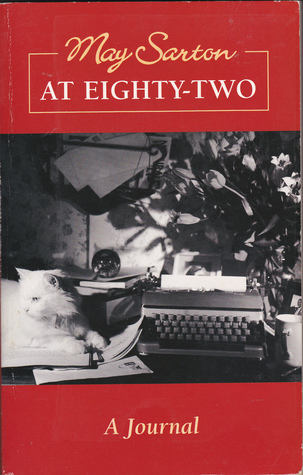

 |

|

The average rating for At eighty-two based on 2 reviews is 4 stars.
Review # 1 was written on 2014-09-18 00:00:00 Francisco Garcia Francisco Garcia Sarton’s own title for her last journal was Kairos: “a unique time in a person’s life; an opportunity for change.” It chronicles roughly 13 months, from July 1993 to August 1994; Sarton died in July 1995 of a recurrence of breast cancer. After 15 years in the small town of Nelson, New Hampshire, where my favorite of her books (so far), Journal of a Solitude, was written, she’d moved on to the seafront city of York, Maine, pop. 10,000 – vs. 300. Even so, after over 20 years in York, she was regularly recognized on the street and people were solicitous. She had an active social life and a busy network of female helpers, including a secretary who took her dictated cassette tapes and typed them up for Sarton to edit by hand. As will be familiar to readers of Journal of a Solitude, Sarton was depressed about various things. She suffered from nearly lifelong clinical depression; in her 82nd year, her doctor even tried her on Prozac for some weeks, but it didn’t help. But more generally, she had many sources of worry. The brutal winter of 1993 seemed endless. She was overwhelmed with correspondence (all still letters in those days), the upkeep on a sizeable house and constant medical concerns – even a two-hour lunch with friends could exhaust her. Work was slow on her new project, a short book about her beloved cat, Pierrot. Sarton was uneasy that her biographer, Margot Peters, was gleaning information by means she didn’t expect, sometimes even gaining access to the tape dictation before she herself did. Although Sarton agreed to the biography, she felt uncomfortable about the methods and worried for the result. And then there was the state of the world outside York: Bosnia, Haiti, Nelson Mandela, impending animal extinctions, and so on. Sarton seemed hugely impressed with how Clinton was dealing with things. She might have counseled activism – “we must simply do something ourselves, whatever we can, instead of being so overwhelmed by the bed news everywhere that we become passive. Act now to wrest some positive thing out of the chaos” – but more often she just let the sadness swallow her. Still, it is impressive to see that she was still engaged with the world, even at her age; illness hadn’t rendered her entirely insular. The chief cause of melancholy, though, was that Sarton feared there was no lasting legacy for her work, especially her poems. She was not getting the reviews or sales she wanted for the Collected Poems, published in 1993, nor was she much anthologized anymore. She fully recognized that she had devoted readers, ones who wrote letters telling her how much her writing meant to them, but that wasn’t always enough. I must give up all thoughts of success in the ordinary sense. I have not had it. Nobody believes this and everybody says, “Think of all your readers.” Yes, but the great number of my readers are ordinary people...right now I feel that in spite of having a great many people read me, I am a failure as a writer. There is no getting around that. I recognize at long last that I will never make it as a writer in the canon. I do have readers—and God bless them—but I do not have any place in the literary world, and that is a fact. It is sad for me, a new fan who only discovered her work last year, to encounter such phrases and think of the years she must have spent feeling like a failure. I applaud Open Road Media for making e-books of Sarton’s greatest works available to more readers, and I can only hope that more people will come to appreciate “the sacramentalization of the ordinary” one finds in her memoirs. “Something is natural and open in these journals, and they are deeper than they look.” Related read: Somewhere Towards the End by Diana Athill |
Review # 2 was written on 2014-07-31 00:00:00 James Bradley James BradleyWritten shortly before she died and published posthumously, this painfully honest journal covers Sarton’s 92nd year, from July 1993 to August 1994. It’s a chronicle of old age and failing strength, and poignant acceptance of all she can no longer do. The daily chores, the demands of interviewers and correspondents, the sheer effort involved in the simplest of tasks is realistically portrayed, and the author often feels frustrated and sorry for herself. But she’s aware too of all the good things that are still in her life and is never self-pitying. She dictated these memoirs so there’s an immediacy to them that is both compelling and always fresh. The book is one of the best portraits of old age I have ever read, and is a valuable part of Sarton’s complete oeuvre. Very enjoyable. |
CAN'T FIND WHAT YOU'RE LOOKING FOR? CLICK HERE!!!